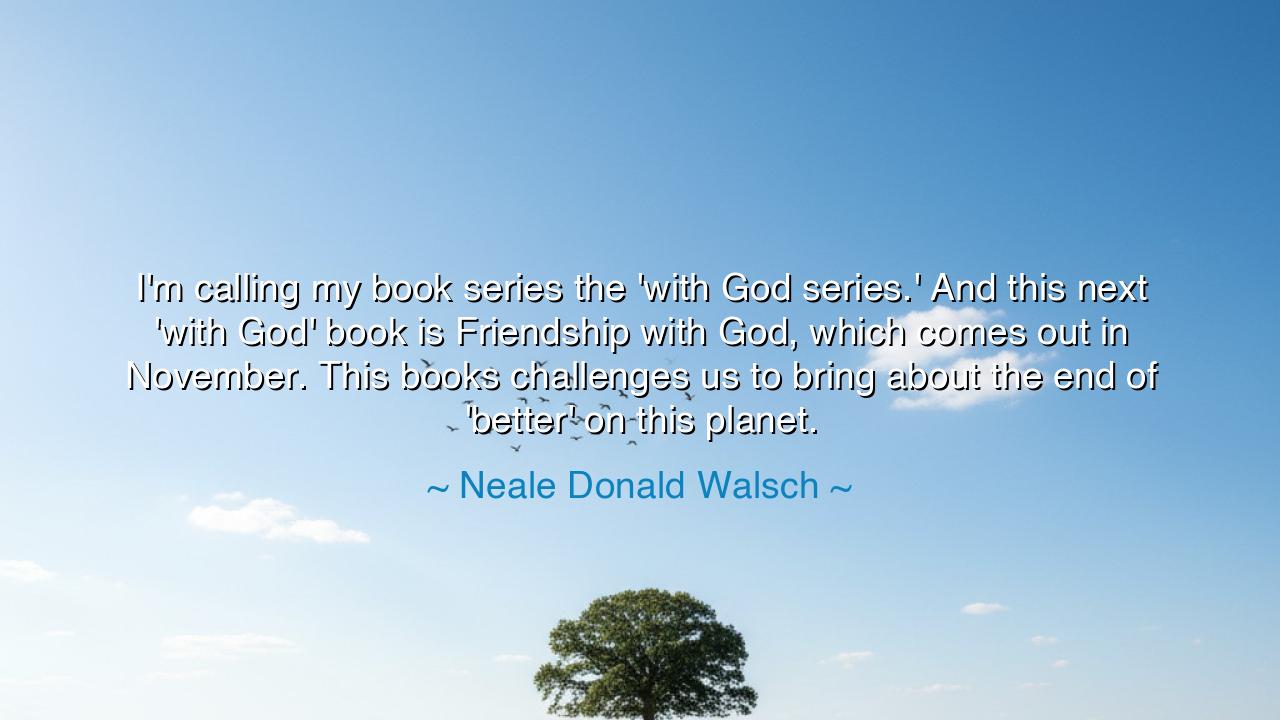
I'm calling my book series the 'with God series.' And this next
I'm calling my book series the 'with God series.' And this next 'with God' book is Friendship with God, which comes out in November. This books challenges us to bring about the end of 'better' on this planet.






“I'm calling my book series the 'with God series.' And this next 'with God' book is Friendship with God, which comes out in November. This book challenges us to bring about the end of 'better' on this planet.” — in these words, Neale Donald Walsch, the spiritual writer whose works have stirred the hearts of millions, reveals not merely the announcement of a book, but a vision for humanity. His With God series — beginning with Conversations with God — was not written as doctrine, but as dialogue: a reawakening of the eternal conversation between the soul and the divine. When he speaks of Friendship with God, he offers not a ritual, but a relationship — a call for humanity to end the endless striving to be “better,” and instead to awaken to the truth that we are already one with God, already enough, already divine.
To the ancients, friendship with the divine was the highest form of enlightenment. The Greek philosopher Socrates called his guiding spirit, his daimonion, not a god to be worshiped from afar but a voice of inner truth — an intimate companion of wisdom. Likewise, Abraham in the sacred texts is called the “friend of God,” not because of obedience alone, but because of his willingness to walk in trust. Walsch follows this timeless lineage, yet his teaching speaks to a modern ache: the endless human need to compare, to compete, to measure one’s worth. When he says that his work “challenges us to bring about the end of ‘better,’” he calls for liberation — for the end of the illusion that we must improve ourselves to be worthy of love, of God, or of each other.
This end of ‘better’ does not mean the end of growth; rather, it means the end of shame. Walsch reminds us that the divine does not demand perfection — only awareness. In friendship, God does not judge, but listens; does not command, but companions. The relationship he describes is not one of fear, but of intimacy. To be in friendship with God is to live as one who is already accepted — who sees divinity not in some distant heaven, but in the breath of every moment, the smile of every soul. It is to cease striving and begin remembering: that we were never separate to begin with.
This truth has been echoed in every sacred tradition. The Buddha, upon awakening, did not claim superiority but compassion; he called all beings his brothers and sisters upon the path. Jesus, too, said to his followers, “I no longer call you servants, but friends.” To be a friend of God is to move beyond fear and hierarchy, beyond the illusion of divine distance. It is to participate in the sacred dance of life — not as subjects bowing to a king, but as co-creators walking beside the Infinite. When Walsch speaks of this friendship, he reminds humanity of what we once knew before the walls of dogma divided us: that God is not a judge to be appeased, but a presence to be known.
In this light, the phrase “the end of ‘better’” becomes a kind of spiritual revolution. For centuries, humanity has built its civilizations upon the hunger to be greater, wealthier, purer — and in so doing has forgotten the sacredness of simply being. Walsch’s challenge is not a denial of progress, but a transformation of its purpose. The quest is no longer to outdo one another, but to out-love one another. The progress he envisions is not material, but moral; not technological, but spiritual. When the need to be “better” ends, the need to compete, conquer, and divide will fade, and in its place will rise the friendship of souls — the harmony of all creation walking with God.
Consider the story of St. Francis of Assisi, who, in rejecting worldly ambition, discovered a profound intimacy with the divine. He spoke to animals as brothers, to the sun as “Brother Sun,” and the moon as “Sister Moon.” To him, the friendship of God extended to all of existence. In his humility, he did not strive to be better than others — he simply sought to live in unity with all. This is the living embodiment of Walsch’s teaching: when one ceases to seek “better,” one discovers the beauty of enough — and in that acceptance, one finds God waiting, not above, but beside.
The lesson of Neale Donald Walsch’s words is thus both simple and revolutionary: you need not become worthy to be divine; you are divine because you are. Seek not to be better, but to be aware. Walk not toward God, but with God. Let go of the striving that separates, and embrace the friendship that unites. In every act of compassion, every word of kindness, every moment of gratitude, this friendship grows.
And so, dear listener, let these words take root in your heart: the divine is not a distant ruler but a faithful friend. You need not reach upward to be loved; you need only open inward. The end of “better” is the beginning of peace. When you stop trying to earn the light, you realize — as Neale Donald Walsch teaches — that you have been walking with God all along, and that this friendship, eternal and radiant, is the very heartbeat of creation itself.






AAdministratorAdministrator
Welcome, honored guests. Please leave a comment, we will respond soon